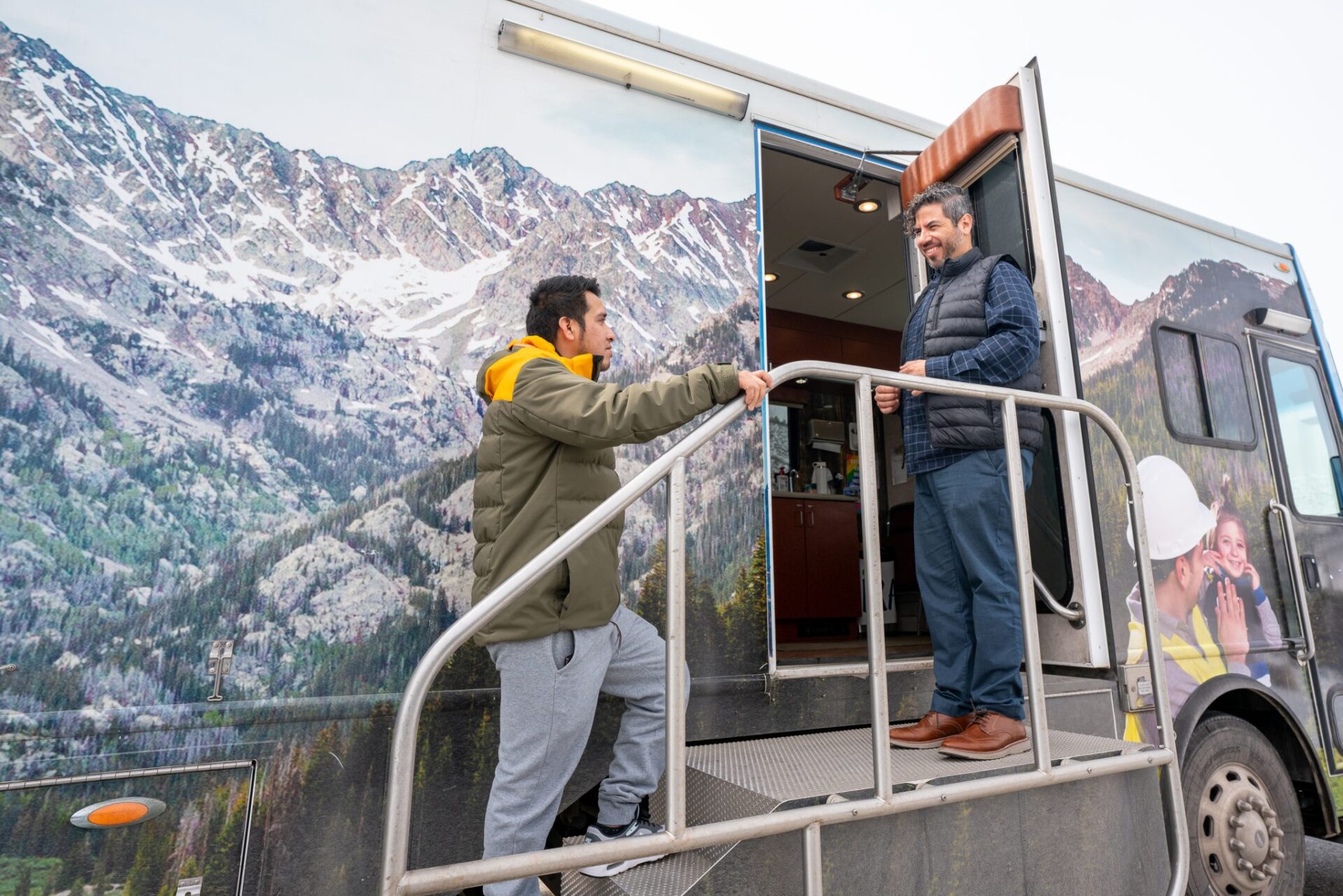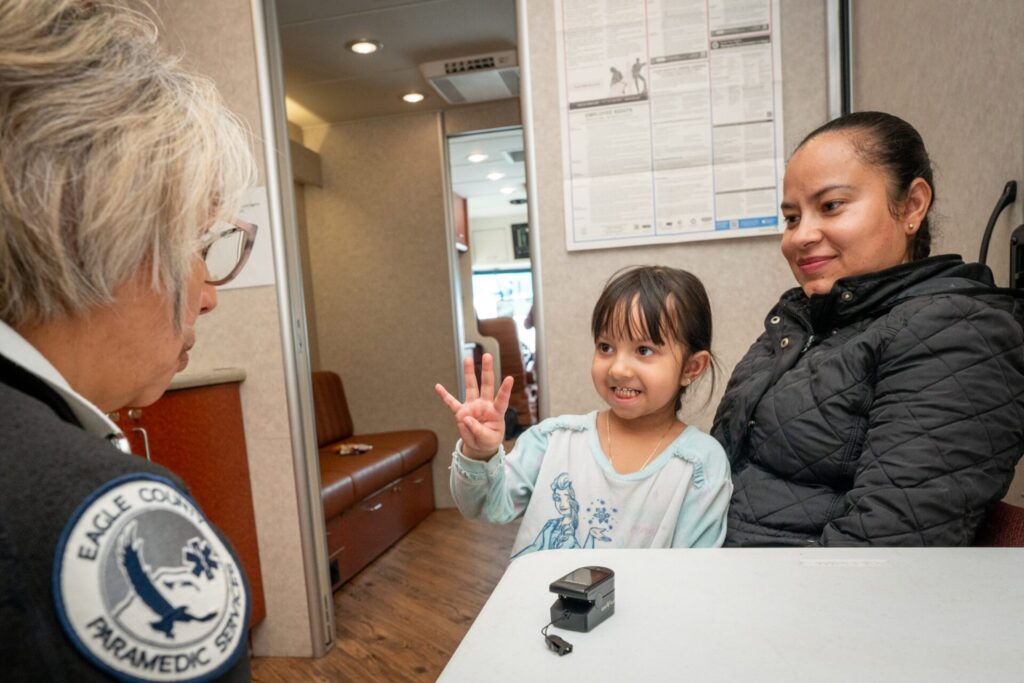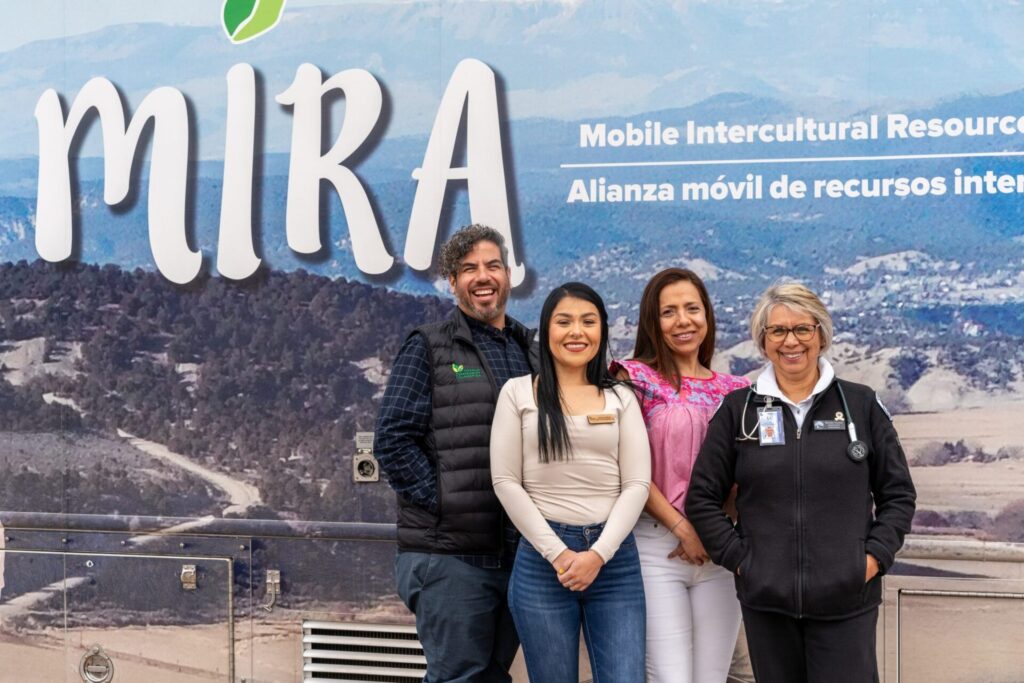
Vail Daily Article – Amid changes, MIRA remains committed to delivering health and wellness services in Eagle County
Amid some operational changes with Vail Health, community members will not feel any service disruption
By Ali Longwell
—
Behind the scenes, the MIRA bus has undergone some small operational changes, but the Eagle Valley Community Foundation is steadfast that they will have no impact on the services and resources provided by the mobile resource center.
What MIRA does
The MIRA bus — which stands for Mobile Intercultural Resource Alliance — was created in 2018 to help link community members to services and assistance around health and wellness needs.
“The way that MIRA works is looking at all the different social determinants of health; (acknowledging) that there are things beyond just treatment of symptoms or an illness or the different things that might be preventing someone from living a healthier life, which includes income, education, job insecurity and unemployment, food insecurity, housing, rolling in those basic amenities and issues,” said Grace Anshutz, the director of development and marketing for the Eagle Valley Community Foundation. “We try to really look at health through the whole person and what are those barriers to addressing long-term healthy outcomes?”
The MIRA bus offers free health assessments and vaccinations as well as helps refer individuals to medical, dental, behavioral health, early childhood and other services. It works closely with the foundation’s Community Market to offer free food and address food insecurity. It also aids community members with enrollment in assistance programs like Medicaid, SNAP and WIC.
The bus travels throughout Eagle County, with consistent monthly stops in various neighborhoods, offering these resources as well as hosting community events.
While MIRA is staffed daily with individuals ready to help with any of these areas of need, it also relies on partnerships for funding and additional staffing support.
In this way, MIRA acts as a “connector,” Anshutz said, working with local nonprofits like Starting Hearts to host bilingual CPR courses, with Habitat for Humanity Vail Valley, SpeakUp ReachOut and many more.
“There are special opportunities when a partner will come to the bus, but that doesn’t mean those services aren’t available every day. Our staff members are always there and are always doing that navigation so they can support any need,” she added.
Shifting supports
Since the beginning, one of MIRA’s partners has been Vail Health.
According to Chris Lindley, Vail Health’s chief population health officer, Vail Health has provided “more than $700,000 in direct funding to support MIRA and its community efforts,” over the past four years.
“Vail Health has not pulled funding from the Eagle Valley Community Foundation. We are continuing to fund health care prevention on the MIRA bus,” Lindley added.
However, there will be a slight change in what Vail Health offers in terms of staffing support.
In 2021, Vail Health in partnership with Eagle Valley Community Foundation, Eagle County Public Health, Mountain Family Health Centers, and Eagle County Paramedics created the Community Health Program “to help address health disparities recognized by the impacts of the COVID-19 pandemic,” Lindley said.
This program provides basic health screenings to uninsured individuals and refers them to primary care at Mountain Family, the community’s Federally Qualified Health Center, he added.
“The only change is that Vail Health staff are no longer on the MIRA bus for the Community Health Program due to decreasing patient volumes,” Lindley said.

Eagle County Paramedics Services will be onboard MIRA twice a week to provide health screenings previously administered by Vail Health staff. Eagle Valley Community Foundation/Courtesy Photo
However, Anshutz was clear this would not result in any service changes to community members.
“Eagle County Paramedic Services, who have been a partner with the MIRA Bus from the beginning, they’ll be doing those crucial health assessments on the bus,” she added. “From the resident-facing side, we’re just shifting who’s doing the work that we’re doing on the bus.”
Paramedics services will be available twice a week to provide these health screenings as well as health education.
These health screenings can be critical as they’re often the first time an individual is getting a health assessment, Anshutz said.
“That can really transform their long-term health,” she added.
One of the other areas Vail Health and MIRA collaborate on is Medicaid enrollment. This work will continue, Lindley said, calling it “very successful and impactful.”
“We continue that great work as we collectively lean in to ensure every Medicaid individual in this community is enrolled and receiving comprehensive health care,” he said.
The current contract between Vail Health and the Eagle Valley Community Foundation is valid through the end of October (the end of Vail Health’s fiscal year), around which time they will have conversations about a future contract and funding support.
Funding
Like many nonprofit organizations and programs, this encapsulates one of the MIRA’s biggest challenges: “The number one challenge will always be funding and just the uncertainty of funding that it’s often on annual contracts,” Anshutz said.
MIRA currently pieces together funding from various partner organizations and individuals.
“The goal of the MIRA funding model, like most nonprofits, is to be as diverse as possible,” Anschutz said.
This includes support from Eagle County Public Health and Environment, which provides “another primary source of funding,” Anschutz said, as well as support from individual community members and grants.
Currently, MIRA is working with the Colorado Department of Public Health and Environment on an immunization grant, with the Department of Regulatory Agencies for insurance enrollment programs as well as with Hunger Free Colorado for the SNAP enrollment programs.
While grateful for the partners that fund and support MIRA, Anschutz acknowledged: “Like any nonprofit, we are constantly striving to increase revenue.”
“We’re really looking at partnership revenue, of how can we collaborate on grants with the Paramedics and Mountain Family Health Centers so that we can continue to increase the opportunities available to neighbors,” she added.
Growing Need

The MIRA Bus is staffed daily with individuals ready to help with any areas of need. Eagle Valley Community Foundation/Courtesy Photo
Growing revenue allows it to meet the growing needs of the community.
From 2022 to 2023, “we saw an increase in like an 89% increase in service utilization,” Anschutz said, noting that this is across its various services.
Anschutz added that one of the largest areas of growing need in Eagle County is food insecurity. This is something it works directly with The Community Market on and saw “an instant hike” after SNAP benefits rolled back in February 2023 after the pandemic, Anschutz said.
“We were seeing on average 4,800 people a week at The Community Market last year. Now, like when the mountain closes, we see an uptick of 6,000, 7,000-plus community members served a week,” she added.
In this situation, MIRA works to address the immediate need — getting people food to put on the table that day — but also to tackle the challenges causing that food insecurity and accessing other supports.
“That’s a hard choice that our neighbors in need really have to make is between putting healthy food on their table and paying a medical bill or ensuring that they have child care for the summer when kids are out of school. And so really, we’ve seen each one of these factors impacts another,” Anschutz said.
MIRA has seen increasing needs around vaccinations in the fall, access to early childhood programs and financial support for those programs, and more, Anschutz said.
Steadfast support
As MIRA continues to push against its challenges and changes, it remains steadfast in providing the resources it does to the community.
“One thing that remains constant for us is like we’re committed to community health and well-being,” Anschutz said.
Part of this includes adapting and expanding to meet community needs. It does so by building trust in the community and remaining culturally relevant.
“I think what our staff do really, really well is they reflect the community that we serve. They understand the unique challenges that come with living in our community, and so they are able to do that work,” Anschutz said. “We keep a listening ear to the ground, asking our neighbors what they need so that we can constantly be adapting.”
To learn more about MIRA, visit EagleValleyCF.org/Our-Programs/MIRA.